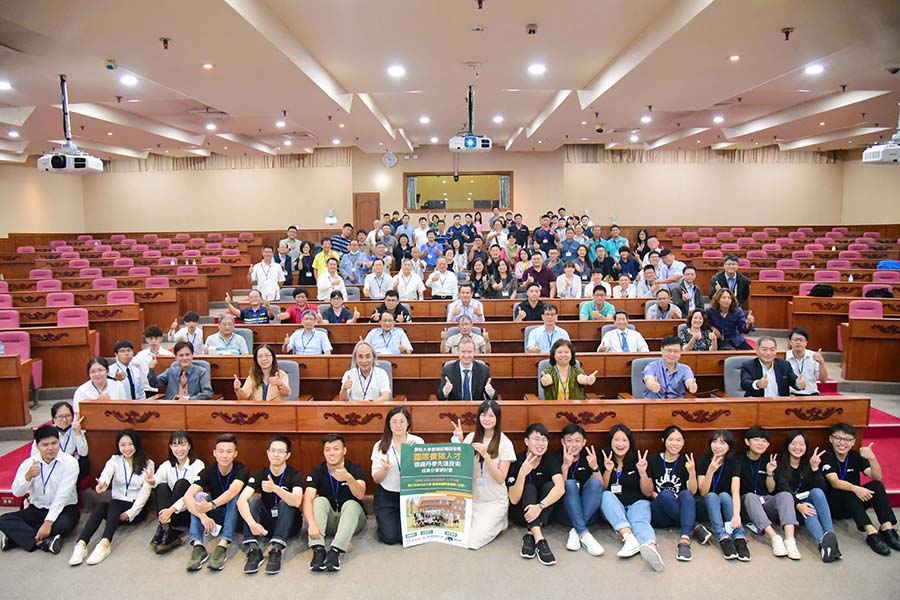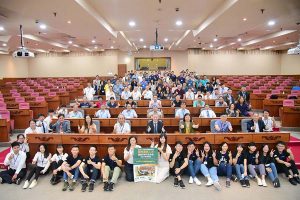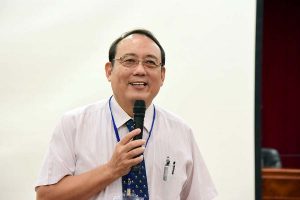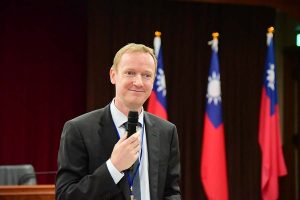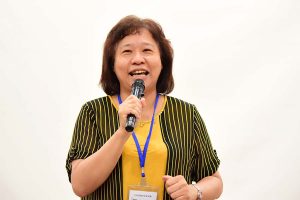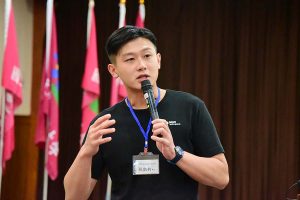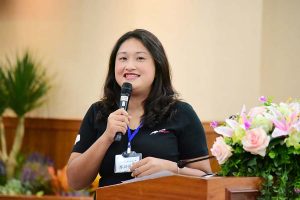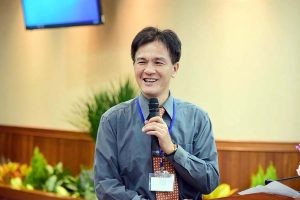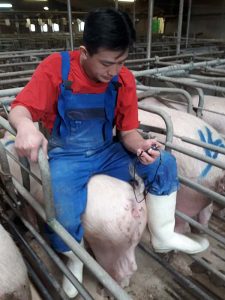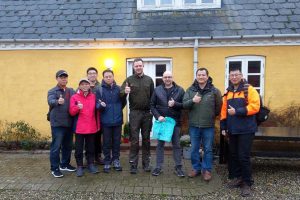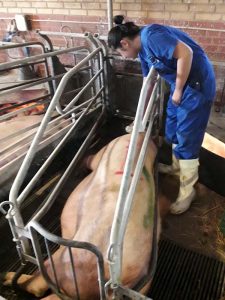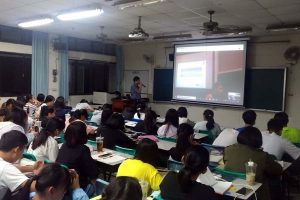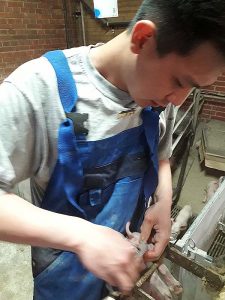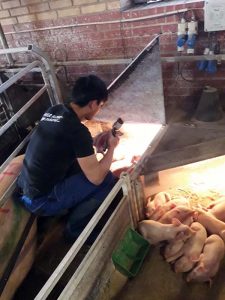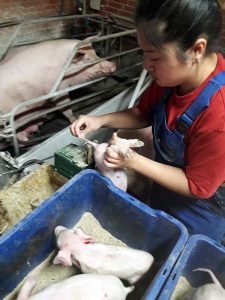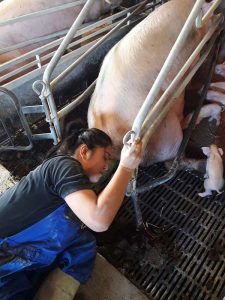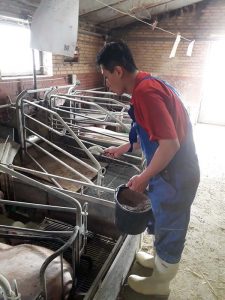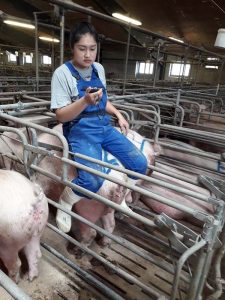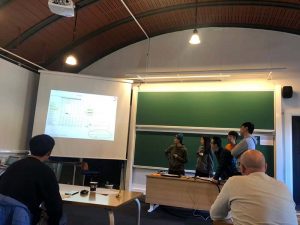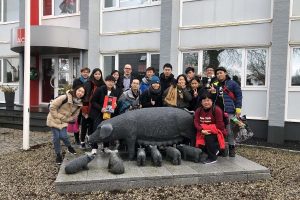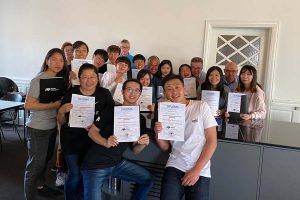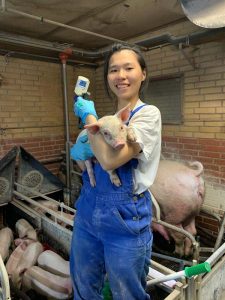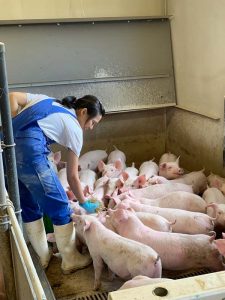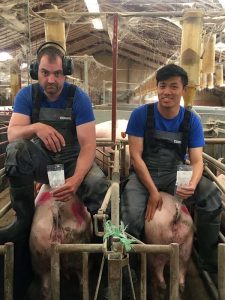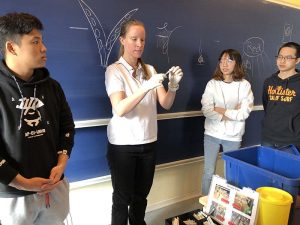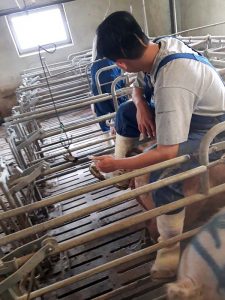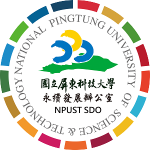Since November 2018, National Pingtung University of Science and Technology (NPUST) has been implementing the “Promotion of International Technical Talent Development Institutes by Technological Universities” project, funded by the Ministry of Education. In collaboration with the Danish Dallund Agricultural College, a team of faculty members from the Department of Animal Science and Livestock Production, along with interdisciplinary faculty members, has established the “International Technical Talent Development Institute for Economic Animals” using the university’s animal husbandry facilities as the base. The goal is to create a “Tropical Swine Farming Technology Consultation and Training Center.” In the second year of implementation, the program has trained 12 “International Professional Swine Rearing Management Instructors” and 28 local students. Additionally, 340 talents have been trained in “Swine Rearing Management.”
To showcase the achievements of the program, a technical results sharing event was held on September 10th at 10:00 AM in the International Conference Hall on the 4th floor of the Library and Exhibition Hall. Distinguished guests, including Director of the Danish Office, Director of the Agriculture Department of Pingtung County Government, Technical Specialist from the Council of Agriculture, and professionals from the swine industry, were invited to share in NPUST’s success in adopting Danish technology.
President Dai Changxian expressed, “This presentation allows our trained students to share the professional knowledge and effectiveness they gained in Denmark. Recent statistics show that the domestic trainees and students returning from Denmark have significantly improved the efficiency of domestic pig farms. We hope to continue cooperating with various sectors to improve our pig farms’ equipment and production management, allowing Taiwanese pigs to have greater market competitiveness and even enter the international market.”
Director of the Danish Office, Mr. Paul Menzel, mentioned, “Denmark’s pig industry is not only highly efficient but also places great emphasis on food safety control and sustainable development. We hope to continue expanding cooperation on these good topics with NPUST. We also hope that professors and students participating in this project can fully apply their learned expertise to benefit Taiwan’s pig industry and contribute to global sustainability.”
Technical Specialist from the Council of Agriculture, Ms. Zhou Wenling, stated, “In the development of Taiwan’s pig industry, we continuously draw on relevant foreign experiences to enhance professionalism while also considering environmental sustainability. By utilizing diversified resource utilization, we strive for the common goal of Taiwan’s pig industry.”
NPUST’s seed professors expressed their hope that Taiwan not only replicates Denmark’s technology and swine management system but also identifies a suitable “Taiwanese Swine Farming Model” based on local conditions. They aim to jointly pursue sustainable development, contributing to the effort for Earth’s environment.
The domestic curriculum, designed collaboratively by 50 local and Danish experts, offers a total of 596 hours of talent development courses. These include 192 hours of “Basic Swine Farming Talent Development,” 152 hours of “Swine Farming Business Management Talent Development,” and 252 hours of “Advanced Swine Farming Technical Talent Development.” The program has recruited students from 11 high schools, 9 universities, the Livestock Research Institute, Taiwan Sugar Corporation, and 20 other livestock-related enterprises or pig farmers. Within two years, the program aims to cultivate 340 talents.
The curriculum is a blend of classroom instruction and practical internships, focusing on hands-on training. It covers various aspects of pig farming, including breeding, feed, environmental management, and waste recycling. The teaching team, comprised of local and Danish teachers, adapts advanced Danish models to meet local needs, creating a specialized curriculum for pig farming talent development in Taiwan.
In the first year of the project (2019), the “Research and Development of Professional Technical Services and Consultation Guidance for Swine Farming” established five research groups: “Genetic Selection and Semen Quality Monitoring Technology for Boars,” “High-Efficiency Feed Formulation Technology,” “High-Efficiency Recycling Technology for Swine Waste,” “EU Regulation Smart and Welfare Swine Farming Technology,” and “Swine Health Management.” The project provided services to 15 pig farms in boar genetic selection and semen quality testing (4985 tests), promoted technology for freezing boar semen and provided guidance on semen quality analysis to seven farms (61 cases), and assisted in disease diagnosis and epidemic prevention measures for 1643 farms (20,064 cases).
Currently, NPUST has sent 28 students to Denmark for training. Besides acquiring subject knowledge, the students have also interned at local pig farms. Some students who run their family pig farms have returned and expressed that “Danish farmers are very united and open in sharing experiences. They work together to reform and solve operational management problems, implementing every aspect of farming management. The hardware and software of Danish pig farms are much more advanced than those in Taiwan, but their unified, simplified, and effective farming management system, combined with the professional quality of the staff, allows them to maintain large-scale pig farm operations with streamlined manpower. These are the keys to Denmark’s success.”
NPUST is planning to inject funds from school funds, assisted by experts from Dallund College in Denmark, to build an “EU-Regulated Intelligent and Welfare Pigsty.” This blueprint aims to establish a modern pigsty at NPUST’s livestock farm that complies with European standards, features automation, intelligence, and welfare, and is suitable for tropical/subtropical regions. The completion is expected by June 2022.
By drawing inspiration from Denmark’s advanced pig farming technology, NPUST aims not only to comprehensively elevate Taiwan’s pig industry but also to establish the “Tropical Swine Farming Technology Consultation and Training Center.” The 12 faculty members trained in Denmark are considered seed professors, and they, along with a strong team of domestic experts, will provide rigorous training through a sandwich-style teaching approach (course-practicum-course). Students will receive solid training on campus and seamlessly transition into the industry after graduation. This not only meets the immediate needs of the industry but also positions the students as leaders in pig farming reform.
After 23 years of effort, Taiwan was declared free of foot-and-mouth disease in 2019. Taiwanese pork has long been known for its quality and deliciousness, and export markets are promising. It is hoped that the establishment of the “Tropical Swine Farming Technology Consultation and Training Center” supported by the Ministry of Education can develop a complete system. This system, covering pigsty design, pig breeding, feed development, disease prevention and control, meat utilization, and meat cold chain systems, will not only export high-quality pork but also diffuse technology to other New Southbound countries, becoming the Asian “Pig Industry” export center.






